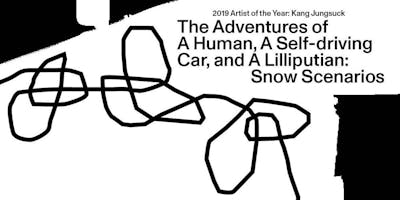You must login before you can post a comment.
2019 Artist of the Year: Kang Jungsuck | Opening Reception
Performing & Visual Arts
Please join us at the Korean Cultural Centre UK (KCCUK) for the opening of The Adventures of A Human, A Self-driving Car, and A Lilliputian: Snow Scenarios, a solo exhibition of KANG Jungsuck, KCCUK's 2019 Artist of the Year. The event will be accompanied by a casual artist talk.
*The event is free to attend, but RSVP is required: https://kccuk.org.uk/en/programmes/artist-year/kang-jungsuck-artist-year-2019/rsvp/1580/
*Any enquiries about the event, please contact: [email protected]
About the exhibition
The Korean Cultural Centre UK (KCCUK) presents Kang Jungsuck’s first solo exhibition in the UK, The Adventures of A Human, A Self-driving Car, and A Lilliputian: Snow Scenarios. Also selected by Korean artist Haegue Yang for the Baltic Artists’ Award, the exhibition marks Kang’s nomination as the KCCUK’s ‘2019 Artist of the Year’, an annual award programme that aims to introduce a key aspect of Korea’s vibrant contemporary art scene to UK audiences.
The exhibition title, The Adventures of A Human, A Self-driving Car, and A Lilliputian: Snow Scenarios, which has been taken from his art work, resembles a typical style of video game titles. Kang has been developing his GAME series since 2016, and this exhibition at the KCCUK is an extension of Kang’s recent show at the BALTIC Centre for Contemporary Art. By adding more seasonal elements in the ‘winter’ expansion at the Korean Cultural Centre, Kang invites the audience into his imaginary and multi-layered environment.
While adopting the game engine as a medium, Kang investigates how human behaviour and sensory cognition are changing due to advancements in digital technology. He takes the Futurama exhibit at the 1939 New York World’s Fair as the exhibition’s starting point, which was designed by Norman Bel Geddes to reimagine the future landscape of the world in 20 years times. The imaginary world in the Futurama showcased multi-lane highways with remote-controlled semi-automated vehicles along with various gadgets, simulated by a seated ride on a conveyor system. Kang revives his own version of Futurama filled with three main ‘creatures’: a Self-Driving Car, a Lilliputian and a Human who enters and spectates the exhibition space.
At the main hall in the KCCUK, Kang envisions the exhibition space as a Self-Driving Car itself and implements the interior of a car in an abstract form. When viewers riding or entering the ‘Self-Driving Car’, they encounter sculptural objects referring to a handling controller and an armrest, as well as many other ‘terrain features’ and ‘props’ in a video game positioned throughout the gallery space. Multiple perspectives from a Human, a Lilliputian and maybe an automobile are intertwined in this fictional space just like virtual spaces in video games or the Futurama exhibit.
Kang has prepared the creatures for the exhibitions in the UK from a physically distanced place in his Seoul Studio. With a sophisticated game engine, Kang has filled the speculated space with various ‘inputs’, saving and deleting them in the virtual space, the game interface of multiple inputs entangled with the artist’s physical studio, eventually arrives at the exhibition space in London, in coexistence. The ‘movement’ taking place between the virtual and the physical space leaves certain traces, generating a form of ‘latency’, which has been the core of the artist’s recent practice.
Encompassing a wide variety of media including sculpture, video and installation, and facilitating collaboration among game engine developers, illustrators, animators, graphic designers and many others, Kang has allowed viewers to experience this transformation of the exhibition space into an interface of video games and to question the possibility of a multi-layered world.
The exhibition is organised by the Korean Cultural Centre UK and the BALTIC Centre for Contemporary Art, Gateshead. Curated by Emma Dean (BALTIC) and Jae Min Cha (KCCUK).
About the Artist
Kang Jungsuck (b. 1984) observes the latency between physical cognition and technically mediated cognition, explaining the correlative sensations that arise by comparing them to video games. Kang postulates that today’s real-life experience has come to resemble a video game, and he pursues a publishing practice that aims to deliver this reality.








